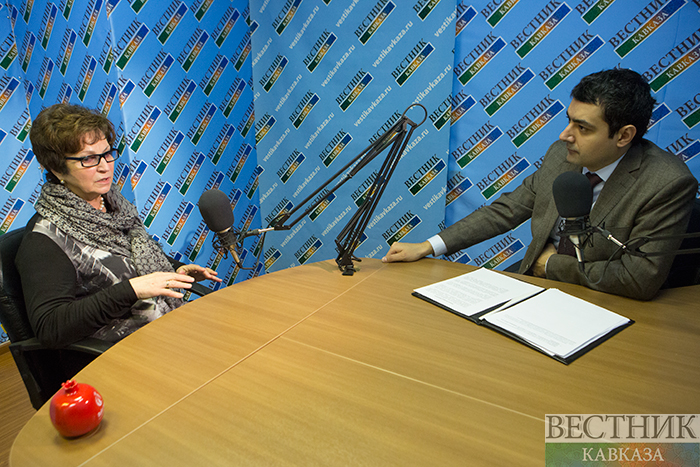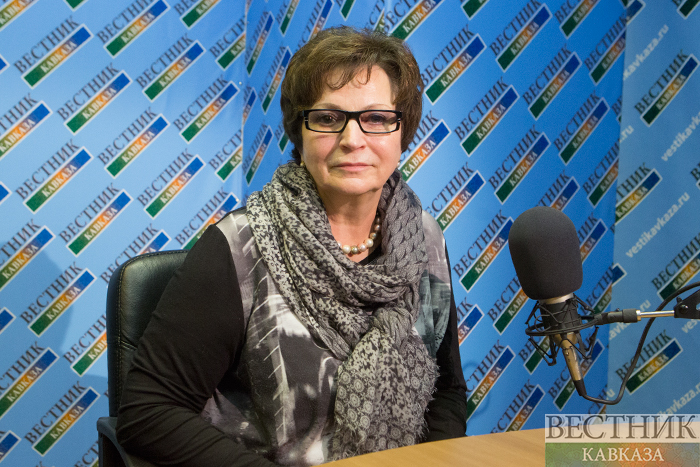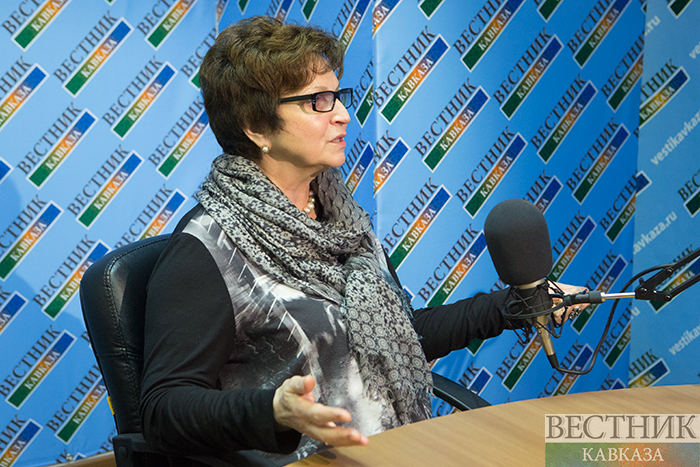Tribune’s guest is a member of the Federation Council Committee for the Federal System, Regional Policy, Local Governance and Affairs of the North, the senator from the Bryansk Region, the chairwoman of the Women’s Union of Russia, Ekaterina Lakhova.
- In late February, we feel an atmosphere of unity of the Russian people, the reunification of the Russian territories. I am referring to the events which occurred in Crimea two years ago. And I know that a special exhibition of paintings by young artists is dedicated to it. Tell us more about it, please.
- The word 'unity' is a very good one. I think that when we speak of unity, we must think about the unity of all the generations. We understand what Crimea and Sevastopol mean. And how do our children, who lived or were born in Russia, and those who joined in Crimea, understand it? When last year we celebrated the anniversary of the annexation of Crimea by Russia, our artists, the 'Irida' organization, which was a part of the Women’s Union of Russia, were actively involved. We have provided our rooms, and there was a great exhibition of Crimean artists. We invited our senators, Crimean citizens and public organizations. It was a small breakthrough in the field of culture.
Last year we held an exhibition in Crimea, which was organized directly by women's organizations. We have two organizations in Crimea: one is headed by Larisa Chulkova, another is headed by Valentina Tumanova. When they held the exhibition, we selected nice paintings and gave the opportunity to hold this exhibition, dedicated to the second anniversary of the association, already in the Women’s Union of Russia. Children from creativity centers of Crimea visit us together with their teachers. We invite children from Moscow creativity centers. Ten remarkable young artists in Crimea have presented their pictures, and they will receive gifts from us. The exhibition is situated in the office of the Women’s Union of Russia at 6 Glinishchevsky Lane.
- Let's turn to the acute agenda. Society is actively discussing the case of Lymar, who is accused of the murder of a child. She requested that her case should be considered by a jury, but she was refused, and recently the Constitutional Court recognized her right to a jury trial. Why can't women have a jury? And how many such discriminatory moments are there in our legislation?
- There are a lot of such moments. In October a government delegation reported in Geneva, it was the eighth periodic report on the implementation of the Convention on the Elimination of All Forms of Discrimination Against Women. Everything about Russia was more politicized at this committee (they attributed to us even Abkhazia and Donbass, where our troops supposedly treat women badly). But there was a correct question that over the years there was no single discrimination-related question to the Human Rights Commissioner. It is really justified, because our women almost don't use the courts to protect themselves, they reject it since we have no clear discriminatory rule in our legislation today, what is meant by discrimination. But at the same time we have the Constitution, one of the articles of which says that if there is no kind of federal law, but there is an international instrument, which has been ratified, we must use it. I want to tell you, there is the Convention on the Elimination of all Forms of Discrimination, where there is a clear explanation of what discrimination is.

- In practice, what was written in a law was not always done. In your opinion, is this common only to Russia or all the countries of the world? In what direction can the largest number of violations be registered?
- The main document that guides women's organizations is the Convention on the Elimination of All Forms of Discrimination against Women in all areas – health, education, economy, social security, media, infringement of rights, politics, etc. They were confirmed at the World Women's Conference in Beijing, where the action platform was determined in 12 directions. Last year, [the head of the Federation Council] Valentina Matviyenko held the International Eurasian Women's Forum in St. Petersburg.
The biggest problem exists in the labor sphere. I mean the difference between women’s and men's wages. We have 30% less wage for women of men's wages. In the European countries the difference is smaller. It is 8-12%. Our difference is currently about 30%.
The second trend of our work is promotion of women at the decision-making level. The decision-making structures are mainly in the power- executive, legislative and judicial power. In the judicial power, women are quite well represented. As for the executive and legislative branches, the representation of women is still insufficient both at the federal and regional levels, and even at the municipal level. And a region where women are the leaders in the power structures always wins. The social policy is more efficient there. If there were more women in the structures of power, there would be more understanding of problems.

- Russia is going through a difficult economic period. There are some studies, according to which women who are even more qualified are given less priority than men at crisis times. Is there any possibility of requiring employers to pay more attention to women?
- We could introduce a quota of women in governmental agencies. But if we speak about an employer, sex discrimination is obvious. A woman is refused, because she has a child or because someday she will give birth to a child. However, business should be socially responsible. I would like to mention two such major enterprises as the Novokuznetsk Iron and Steel Plant and Surgutneftegaz. At Surgutneftegaz, there are about 50 women's councils, and at the Novokuznetsk Plant, there are 100 of them. They are involved in discussion of the collective contract, protecting women’s rights, including maternity preservation. When the President asks questions about demographic policy, support both at the state level and at the level of the private sector is important. It can be very difficult for small and medium-sized enterprises. As for big enterprises, they have a more balanced policy in this respect. We have a program of retraining women who are on maternity leave for a year and a half. But the employment services work very poorly and they are not always constructive. And society must be engaged in a dialogue to fix a problem in general. That is why we talk about the very active development of women's councils at all levels. Basically, civil society is concentrated in the regional centers, in major cities at the federal level. They should undertake commitments in order to develop the interests of a small city or a settlement directly at its regional level.
Women's literacy is very important. Last year about 200 students studied at our School of Civic Engagement in Crimea. We hold two Schools of Civic Engagement among heads of settlements and heads from 16 regions. We improved their legal literacy, speaking about the law on social service of citizens of the Russian Federation, the law on public control. The authorities don't always welcome social organizations. It means they provide a dialogue and listen. When they start listening, progress will come. Sometimes I think how much patience our President has, as he listens to very different positions and finds new forms of dialogues and interaction.
We have talked about the national idea for a long time, that it should be a family. At the conference we decided that we should unite around the President. The opposition to the Institute will try to beat it both internally and internationally. We saw it in Ukraine: when the presidential institute was attacked, everything got shattered.
Patriotism should be introduced from childhood. We should remember the most interesting forms that were used in Soviet times. We supported Natalia Faustova’s "Lullabies for the Whole Family" project. It is aimed at revival of the culture of singing lullabies as a necessary link between generations. I supported the project because I was a grandmother. Natalia should use a CD with well-decorated books I immediately thought: "This should be a project of the "Union of Russian Women". We will lobby for this project.

- Ekaterina Filippovna, violence in families is a pretty sensitive issue for Russia. There is even such a saying, "if he beats you it means he loves you." How to improve the literacy of women, and how to break this stereotype?
- If we fail to introduce the foundations of culture at school, the situation won't change. Today we are speaking about development of various social institutions, crisis centers for men and women. Alcoholism is also an important issue. So if we fail to bring up little children of pre-school age that this is terrible, we won't change the situation. Today Fathers’ Councils have begun to develop due to Women’s Councils. And I hope that federal organizations of fathers will be created. When they raise issues of problem families and jointly develop some plan of actions. A moral impact is necessary to give society our own assessment not only according to the law: "You have broken the law and we will put you into prison."
- They say often wives file an application in order to frighten their husbands, but after that they take applications back.
- Sometimes it happens so that she scared him once, scared him a second time, and then murder occurs. I will never forget a woman who said how much her husband abused her. The police knew about it, the neighbors saw when he threw a three-year-old child into the cold street… In the end she killed him. And she ended up in prison. The police did not protect her, the neighbors, no one protected her. We must realize that this is a problem. In European countries the law works against violence, and citizens also do not pass by.
- For example, the US has compulsory treatment of drug addiction. After all, alcohol is the same thing.
- Well, medical-labor dispensaries were probably not so effective, but they were necessary. Medical-labor dispensaries and sobering-up stations were given doctors. Alcoholization of society and youth unemployment are serious problems.
When our young people are busy, they see the future. Let's revive construction brigades – guys want to make some money during the summer. There were excavations, archaeological, geographical expeditions, patriotic games. We have great experience. The creation of the public-state organization 'Movement of Students' is very important. There were Octobrists, Pioneers, Komsomol. It helped to organize the youth. At schools, there were lathes and housekeeping. But a child should have motivation, have some interest.
In a corporate college at Bryansk, we organized the Brides’ School, and in a nearby construction college, we have the Bridegrooms’ School. Girls learn how to create comfort and stability in the family. The stability of society depends on a woman’s wisdom, skills, her social experience. Who saved families in the 1990s? Women were shuttle traders and went back and forth with bags. They had to survive. A woman adapts better than a man socially, her organism is designed that way – save yourself, children, family, save peace, Russia. This is a goal for a woman.






